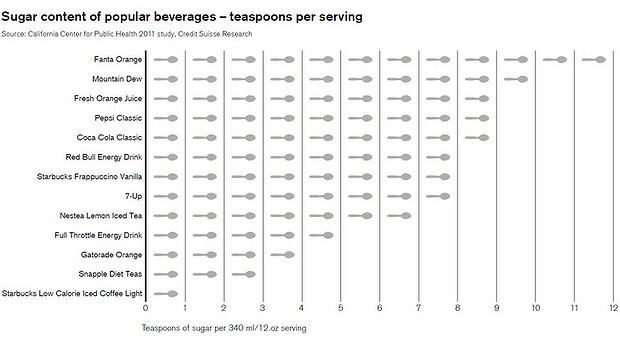Search
Democracy Links
Member's Off-site Blogs
sweet poison ....

Food manufacturers could be facing their tobacco moment as growing consumer awareness on well-being turns towards commodities such as sugar, a global report says.
The report on sugar, compiled by the Credit Suisse Research Institute, highlights the need for the food and beverage industry to tackle the focus on obesity head-on by joining a diversification into new healthier products.
“The potential for a surge in negative public opinion and the looming threat of regulation and taxation are issues that the food and beverage industry clearly must address, though the extent to which they can do so without hurting their current business models is up for question,” said the report’s authors, Giles Keating, Credit Suisse’s research head for Private Banking and Wealth Management, and Stefano Natella, the financial services firm’s co-head of Global Securities Research.
“From the expansion of ‘high-intensity’ natural sweeteners to an increase in social responsibility messages from the beverage manufacturers, we see green shoots for dietary changes and social health advancement.”
The investment bank also released a video that graphically highlights the dangers of excess sugar consumption, estimating the costs to the global healthcare system at $US470 billion ($488 billion).
Australians are among the world's biggest sugar consumers, joining the US, Brazil and Argentina in taking in more than double the world’s average of 17 teaspoons a day, the report said. In comparison, the American Heart Association recommends six teaspoons of added sugar for women and nine for men.
"I think people don't understand that when they or their child drink one glass of sugary soft drink, it would be equivalent to watching your child put six scoops of sugar in a cup of tea, which none of us would tolerate,” Public Health Association of Australia’s chief executive Michael Moore said.
Mr Moore said unlike the health fears around tobacco and alcohol, which involved a product people do not have to consume, food is something we need, so tackling the obesity problem and people’s daily sugar intake would be more complex.
A National Health Performance Authority report on obesity by locations released today found that people in some rural NSW areas were three times as likely to be obese as residents in Sydney’s north shore.
The Credit Suisse report surveyed general practitioners across the US, Europe and Asia and found 90 per cent believed the growth in type II diabetes and the current obesity epidemic were strongly linked to excess sugar consumption.
The World Health Organisation is projecting that diabetes will be the seventh leading cause of death in 2030. The global body estimates about 347 million people worldwide currently have diabetes, with more than 80 per cent of diabetes deaths occurring in low- and middle-income countries.
"Although causality is difficult to prove in this area, with such a high percentage of doctors in our proprietary survey confident of this strong link, we cannot ignore the significance and the implications for society and our economy," Mr Natella said.
Changing the amount of types of sugar in foods would also be a challenge, given the “legendary … extensive lobbying power of the sugar industry”, the report stated, adding the lobby “is often referred to as the second most political commodity in the world - after oil”.
Even so, Credit Suisse private banking’s chief investment strategist for Australia, David McDonald, said food and beverage companies could adjust their product ranges to meet changing consumer tastes and health concerns.
“If you are a tobacco producer, there wasn’t a lot you could do, because that was what you made. Whereas if you are a Coca-Cola or a Nestle, you can say ‘let’s start promoting diet Coke and things like that’,” Mr McDonald said.
By self-regulating and adjusting their product range, companies could reduce the risk of government-imposed regulations and taxation measures. In Latin America, countries such as Guatemala, Argentina and Brazil have soft drink taxes.
One company cited in the report is Swiss multinational firm Nestle, which is already working with new artificial sweetener producers and looking to develop other sugar replacements.
At the same time, shareholders in such food and beverage companies could push them to be proactive and keep ahead of the public health concerns rather than wait for measures to be imposed on them, Mr McDonald said.
Mr Moore said governments, industries and public health professionals could work together to implement a range of measures, such as the star-rating system and front-of-pack labelling, to encourage consumers to move away from the products with high sugar content.
Public health campaigns, the availability of obesity location data, marketing restrictions and taxation measures could play a big role in changing consumers’ behaviour, he added.
Further reading:
- World Health Organisation fact sheet on diabetes
- World Health Organisation fact sheet on overweight and obesity
- National Health Performance Authority report on obesity by locations
- By John Richardson at 25 Oct 2013 - 8:19am
- John Richardson's blog
- Login or register to post comments
Recent comments
5 hours 35 min ago
6 hours 8 min ago
6 hours 30 min ago
6 hours 49 min ago
7 hours 34 sec ago
19 hours 49 min ago
20 hours 5 min ago
21 hours 52 min ago
22 hours 34 min ago
1 day 3 hours ago